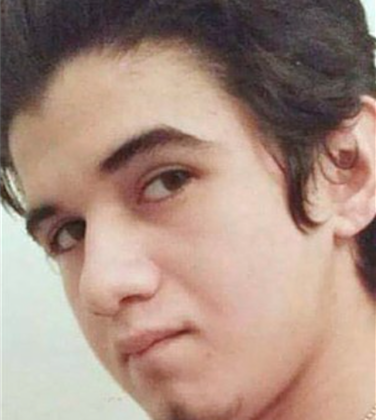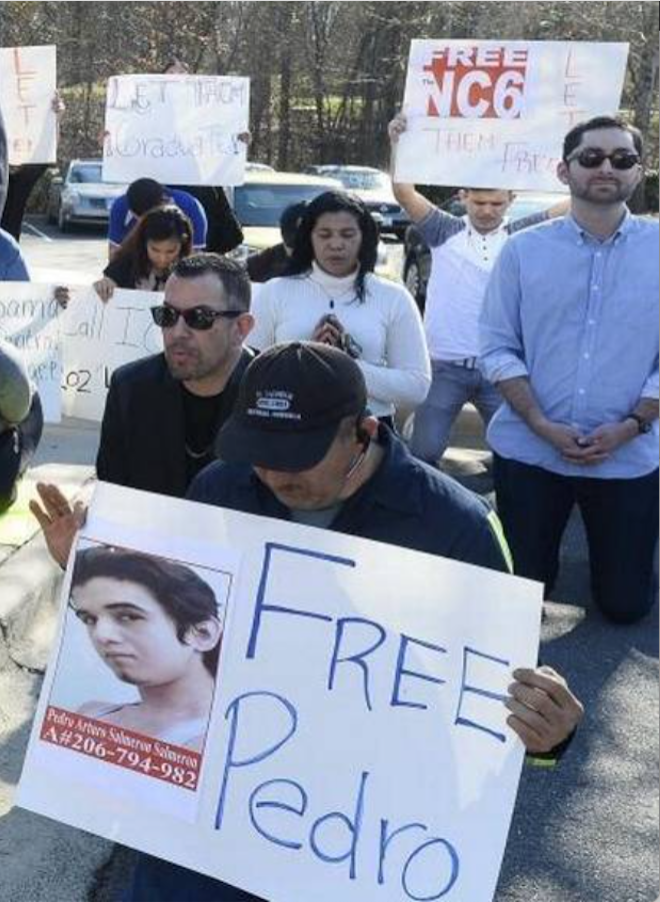
On an early morning in late January of this year, a young man named Pedro Salmeron was riding in the passenger seat of his father’s truck in Charlotte, NC when ICE agents stopped the truck and detained Pedro. His crime: fleeing gang members in El Salvador that had just brutally murdered his cousin. This may sound hard to believe but it is the official policy of the Obama administration with regard to refugees fleeing violence in Central America.
For most of the world, the term refugee children conjures up heart-wrenching images like the young boy sitting in a chair, stunned by a recent bombing in Syria, or the child washed up on a beach in Turkey after a boat carrying refugees capsized. Here in North Carolina, the refugee crisis has a local component as well and looks like an adolescent from Central America getting arrested at a school bus stop.
The morning commute has become an act of peril for many Central American refugees in North Carolina and across the South as ICE agents began targeting them on their way to school or work earlier this year.
Six young men who were swept up in this dragnet have come to be known as the NC6. After a huge public outcry and tireless effort by school teachers, advocates, and the community, three of the six were released but three still remain locked up in a private prison in Georgia and all still face the risk of being deported back to the violence they fled by coming to the United States.
As Pedro Sits In A Private Prison In Georgia, President Obama Will Host A Summit On Refugees With Leaders From Across The World
In less than two weeks, President Obama will host a summit on refugees as an addendum to the United Nations Summit for Refugees and Migrants taking place the day before on September 19. As the President seeks to build stronger commitments to refugees worldwide, it is time for him to abandon his own commitment to a flawed policy regarding Central American refugees like Pedro and the NC6.
Since 2014 when a large wave of Central American youth presented themselves at our southern border seeking refuge from violence, the Obama administration’s response has been focused on deterrence. To this end, they have sought to discourage other refugees from making the journey to the United States by locking up and deporting those who arrived in 2014. Another core component of this deterrence strategy is our collaboration with Mexico to turn away Central American refugees at the southern border of Mexico; for which Mexico has received more than $86 million dollars from the United States.
Whether they get stopped in Mexico or the United States, the result has been the same. As Nicholas Kristof of the New York Times wrote:
“If other countries were forcibly returning people to their deaths, we would protest. But because we Americans worry about refugees swarming across our borders, we help pay for Mexico to intercept them along its southern border and send them back home, where they may well be raped or killed. I’m mostly a fan of the Obama administration, but this is just plain immoral.”
The Overwhelming Majority Of Central American Refugees Do Not Have Proper Legal Counsel To File An Asylum Petition
The vast majority of young people fleeing violence in Central America do not have the help of a lawyer to present their case in front of an immigration judge. Facing economic, cultural, and language barriers, these young refugees are not able to navigate the very complicated process of defending themselves in deportation proceedings and seeking asylum here in the United States. As a result, the Obama administration has no idea whether the people they are detaining and deporting would be in danger if they returned to their country of origin.
In the end of July, Pedro was transferred to a location in Louisiana as the last step before his imminent deportation. After relentless pressure from the community and elected officials, the Department of Homeland Security temporarily postponed his deportation and transferred him back to his cell in Georgia. But it is important to note that the Obama administration was just hours away from deporting a young man back to El Salvador who fled to the United States three days after a family member was decapitated and castrated by gang members.

As we begin the month of September, Pedro continues to be locked in a private prison in Georgia and is likely to still be there in two weeks when world leaders gather in New York to discuss refugees.
The Department Of Justice Made A Groundbreaking Commitment In August To Terminate Their Contracts With Private Prisons And The Department of Homeland Security Should Follow Their Lead
The movement to protect the NC6 here in North Carolina, which has been joined by elected officials like Congresswoman Alma Adams (D-NC) and Congressman G.K. Butterfield (D-NC), is driven by the obvious: children fleeing for their lives should not be exposed to further trauma by locking them up in a private prison, often times under solitary confinement. One of the best investigative journalists in North Carolina, Belen Jordana Ariz of Univision 40, has covered these cases extensively and her visits with the youth at Stewart Detention Center in Lumpkin, Georgia have exposed the additional trauma caused by their incarceration.
The Department of Justice made a groundbreaking commitment in August to begin steps to terminate their use of private prisons. In announcing the decision, Deputy Attorney General Sally Yates stated “[private prisons] simply do not provide the same level of correctional services, programs, and resources; they do not save substantially on costs; and… they do not maintain the same level of safety and security.”
What the report fails to mention is that private prison contractors have invested millions of dollars over the years to lobby Congress for additional mechanisms to trigger higher incarceration rates to fuel their bottom line. In many ways, private prison corporations like CCA and Geo Group, have become the tail that wags the dog of government.
As a country, and especially here in the South, we should be deeply concerned by these modern day plantations that lock up black and brown bodies to generate profits for corporate executives and shareholders.
Just last week, DHS Secretary Jeh Johnson announced that he will conduct a review of their use of private prisons, signaling that this deeply entrenched evil of mass detention has never been more vulnerable. With a precious few months left in his term, President Obama should encourage DHS to follow the DOJ’s lead.
In His Remaining Months In Office, President Obama Has The Opportunity To Curb A Draconian System That Profits Off Of Pain And Family Separation And Chart A New And Humanitarian Path Forward On Refugees
With just just over four months left in his presidency, Obama could become an unabashed leader on detention policy reform and refugees. Just as he is working ardently to commute the sentences of hundreds of U.S. citizens who are serving out sentences that exceed their crime, he could intervene to fracture a model that incentivizes the detention of immigrants and creates no distinction between refugee children and threats to society.
As world leaders prepare to gather at the United Nations in several weeks, Pedro Salmeron continues to sit in a jail cell in Lumpkin, Georgia. He is just a boy. He has been traumatized by eight months of incarceration and almost being deported back to the country he fled. He desires nothing more than to be reunited with his family and make his case for asylum.
The decisions that are made about Pedro and other Central American refugees over the coming months will in many ways define Obama’s legacy on immigrants and refugees. Here’s what leadership looks like leading up to the world summit on refugees:
- Ensure each applicant for protection in the U.S. receives a full and fair process here in America – particularly the most vulnerable: unaccompanied children;
- Allow applicants for asylum to remain with their family or guardian while their case is pending in place of lengthy and traumatic stays behind bars;
- Follow the lead of the Department of Justice and encourage Secretary Jeh Johnson of the Department of Homeland Security to terminate all contracts with private prisons;
- Expand efforts to deal with the root causes of the refugee situation – horrific violence in the sending countries, especially targeting women and children;
- Work with our allies to provide safe haven in Central America and Mexico so those fleeing can find protection in the region;
- Expand orderly resettlement programs – from within El Salvador, Honduras and Guatemala, and from the neighboring countries of first asylum, so that those seeking to join family in America have workable alternatives to making the dangerous journey to the U.S.-Mexico border, and other countries in the hemisphere can provide resettlement opportunities as needed;
- Grant Temporary Protective Status (TPS) to refugees fleeing violence in Central America.

